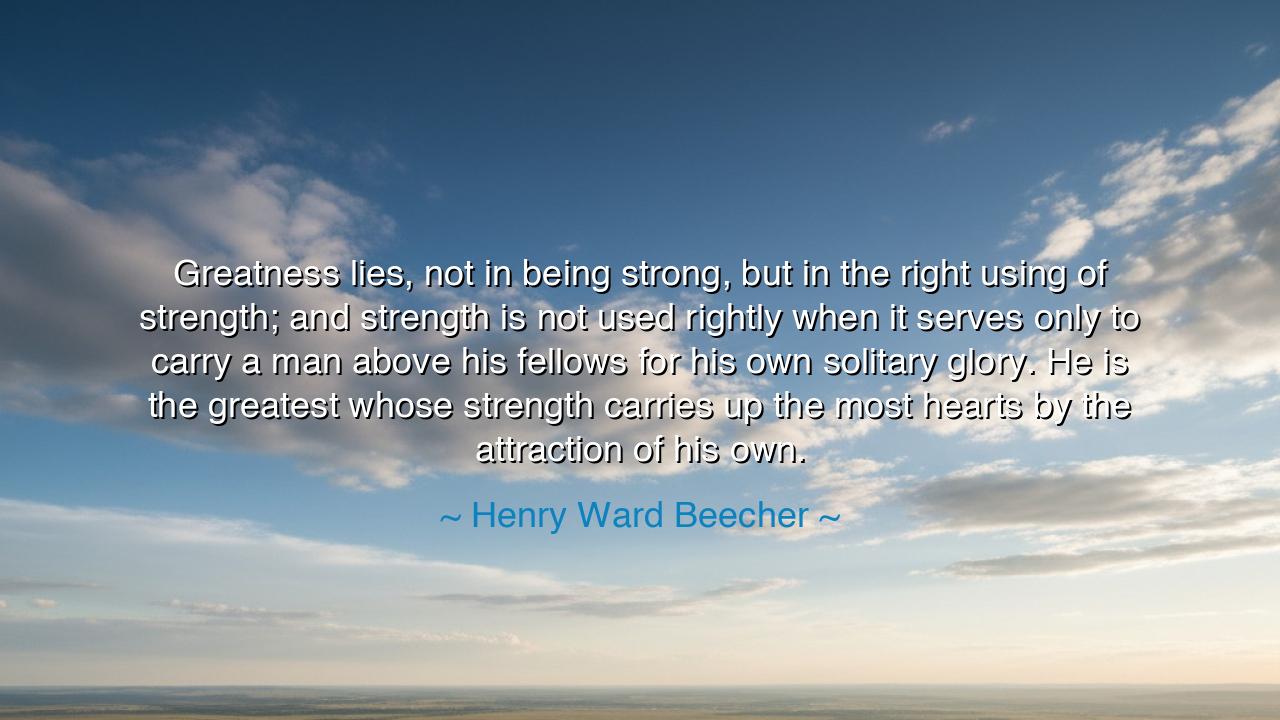
Greatness lies, not in being strong, but in the right using of
Greatness lies, not in being strong, but in the right using of strength; and strength is not used rightly when it serves only to carry a man above his fellows for his own solitary glory. He is the greatest whose strength carries up the most hearts by the attraction of his own.






“Greatness lies, not in being strong, but in the right using of strength; and strength is not used rightly when it serves only to carry a man above his fellows for his own solitary glory. He is the greatest whose strength carries up the most hearts by the attraction of his own.” — Henry Ward Beecher.
Thus spoke Henry Ward Beecher, the fiery orator and moral teacher of the nineteenth century, whose words cut through pride as a sword through mist. In this radiant truth, Beecher reminds us that true greatness is not domination but elevation — not the triumph of one over many, but the rising of many through one. Strength, he says, is not a crown to be worn for vanity’s sake, but a sacred trust, a gift meant to lift the weary, guide the lost, and inspire the fallen. The strong man who uses his power only to glorify himself stands small beside the one who bends his might to serve others.
The origin of this wisdom lies in Beecher’s life and his preaching — in the turbulent years of a divided America, when the nation’s moral and physical strength were being tested in the fires of slavery and war. Beecher, a minister of fierce conviction, saw how power could corrupt when untamed by compassion. He had witnessed men who wielded strength to oppress, and others who used it to free. Out of this vision came his understanding: that strength without purpose is vanity, but strength guided by love becomes greatness. He spoke not to flatter heroes, but to call forth the heroism that lives within every soul — the strength that uplifts, not conquers.
In the ancient world, this truth was also known, though few lived it fully. Alexander the Great, though mighty in conquest, died alone and restless, for his victories filled lands but emptied hearts. His strength carried him above all men, yet it carried no one with him. But Marcus Aurelius, emperor and philosopher, ruled with humility and sought to strengthen the souls of his people. He understood that leadership is not ascendancy, but stewardship — that greatness does not shine from the throne but radiates from service. Beecher’s words echo this same eternal law: that the worth of power is measured not by how high it lifts the one who holds it, but by how many it raises alongside him.
To use strength rightly, then, is to remember that all power — of body, of mind, of position — is entrusted to us for the sake of others. The hand that builds, the voice that leads, the mind that teaches — these are sacred instruments, and they become instruments of greatness only when moved by compassion. Beecher warns against the solitary glory that isolates the strong man in his tower of pride. For though he may stand above his fellows, he stands alone, and solitude born of ego is a prison of the soul. True glory is communal; it is found in shared triumph, in the joy of seeing others lifted by the strength of one’s own heart.
Consider Florence Nightingale, the lady of the lamp, who during the Crimean War used not physical might but the strength of will and mercy to tend the wounded. Her greatness lay not in her authority, but in her compassion. She did not rise above men; she knelt among them. Yet through her humility, she carried up countless hearts — soldiers, nurses, and generations to come who would see in her example the right use of strength. In her, Beecher’s teaching finds its living image: she became great not because she was strong, but because she used her strength to heal and uplift.
And so, Beecher’s words are both a mirror and a warning. They ask each of us: How do you use your strength? Do you wield it to shine alone, or to cast light upon others? Do you build ladders for the weary, or thrones for yourself? The one who helps another to stand grows taller in the act; the one who pushes others down, though high in stature, grows smaller in spirit. The attraction of a noble heart — that mysterious power that draws others upward — is the truest proof of greatness. For only love can multiply strength without diminishing it.
Therefore, let this be the teaching to all who seek greatness: Use your strength to lift, not to lord. Let your might be guided by mercy, your ambition by empathy, your courage by compassion. Be as the mountain that shelters the valley, not as the tower that casts its shadow upon it. Remember that greatness is not an inheritance but a responsibility, and that the measure of your power is not in how many bow before you, but in how many rise beside you.
For in the end, as Beecher said, he is the greatest whose strength carries up the most hearts by the attraction of his own. The world remembers not the strong who conquered, but the strong who cared. So let your strength be love in motion — a light that does not blind, but guides; a flame that does not consume, but warms. For only then will your greatness endure, and your heart, like a sun, lift all who walk within its glow.






AAdministratorAdministrator
Welcome, honored guests. Please leave a comment, we will respond soon